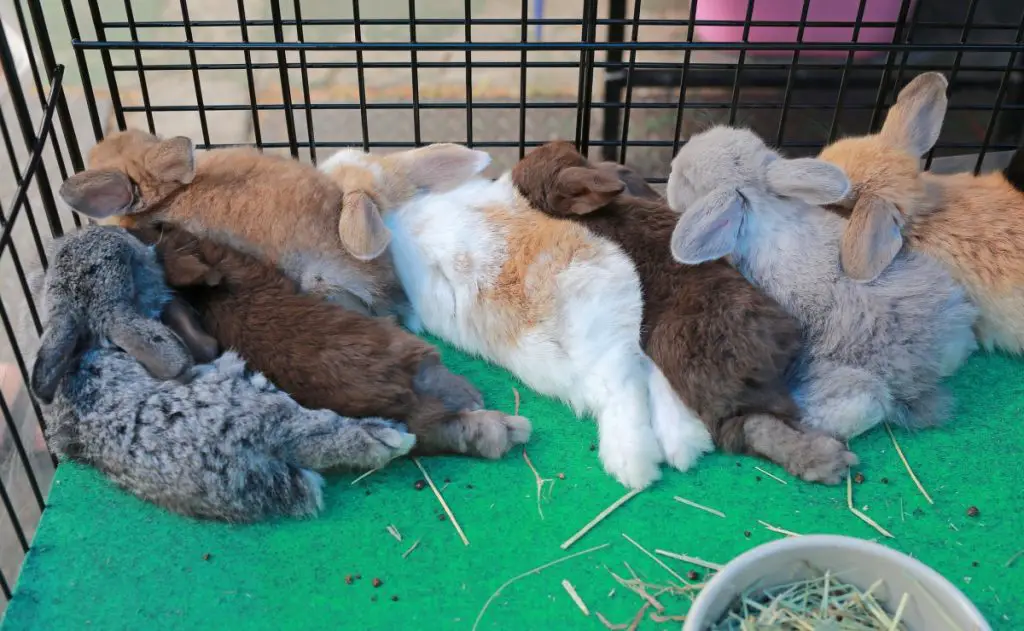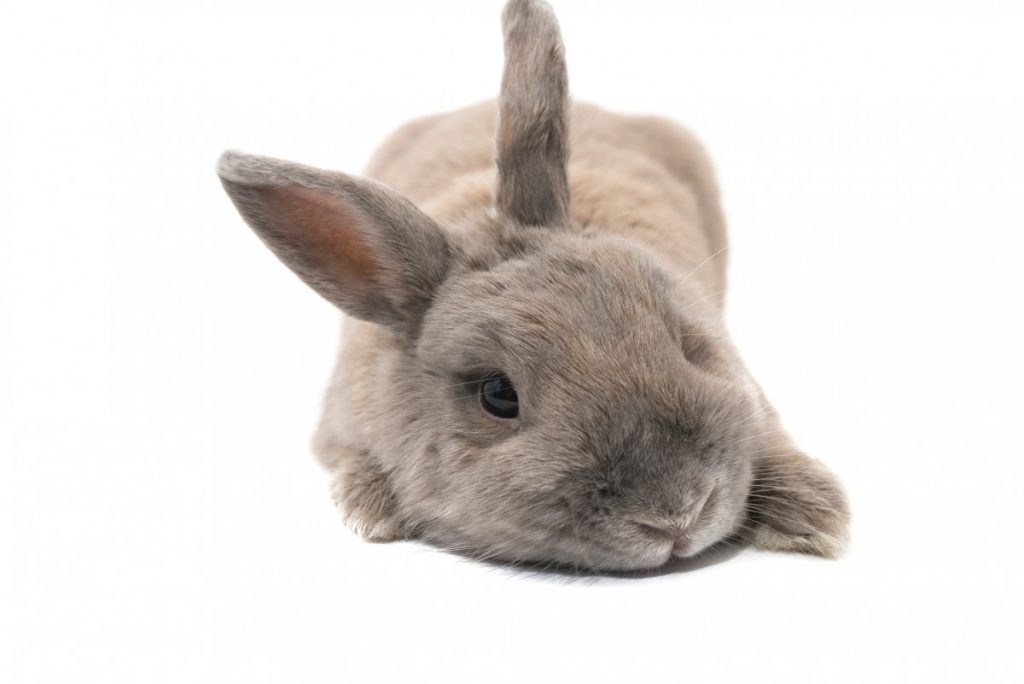
Have you ever wondered how much sleep your pet bunny needs or actually does, during a given day? You’ve probably noticed that your bunny seems to run around, eat, and is very active during what seems like random times of the day. When you want to spend time and play with your bunny, you find them asleep instead!
Unlike us humans, rabbits do not have the same sleep cycles nor do they sleep the same amount as we do. Their sleep patterns can get pretty tricky to get used to, especially if this is your first time owning a pet bunny. Let’s take a look at how much pet rabbits sleep so we can better understand their sleep patterns and plan our day around them.
How Long Pet Rabbits Sleep
The average pet rabbit sleeps for 8.4 hours per day. However, a pet rabbit can sleep for as much as 11.4 hours in a given day (source 1, source 2). Because domesticated rabbits live in a much more controlled and safer environment, they feel far more comfortable sleeping for longer periods of time.
This doesn’t mean that they will sleep for 11.4 hours straight. You will find your bunny full of energy and keeping itself busy throughout different parts of the day and night, and then sleeping in between.
Now, do they sleep the exact same way during those 11.4 hours? What you will find fascinating about your bunny is that it also experiences different states of sleep, as humans do. Studies have shown that rabbits can go from light sleep to a dream state of sleep (source.)
Here are the most common sleep states your bunny will experience:
- 25.9% Drowsy Sleep – This is when they experience light sleep or are half asleep, also known as a quick nap. They can still be alert for predators during this state.
- 64.5% Slow Wave Sleep – This is when they’re in a deep sleep where their body is completely relaxed and their mind is completely at rest.
- 9.6% Paradoxical Sleep – Also known as REM active sleep, this is the deepest stage of sleep and is when your rabbit has drifted off into the dream world!
As you observe your sleeping furry friend, you’re probably asking a couple of questions. Why do rabbits sleep at different times of the day? And how can we know when they need to sleep? We will explore every aspect of sleep when it comes to your pet bunny so that you will know what you can do to ensure your bunny gets its beauty rest like we do!
When Pet Rabbits Typically Sleep
Rabbits get most of their sleep between the hours of 11am and 6pm, with occasional napping occurring during the night between midnight and 5am. It is actually quite predictable when your furry companion goes to sleep. Rabbits are crepuscular creatures, meaning they are most active during dusk and dawn. Between those two points of the day is when you will most likely find your bunny much more calm or asleep.
Just because you may find your bunny asleep during the daytime, does not mean they are nocturnal creatures. At some point in the middle of the night, they eventually go to sleep. Also, rabbits can’t really see in the dark like owls do. That’s why they are most active at dawn and dusk, where the light is perfect for their eyesight and they feel the most confident and safest from predators.
In the animal kingdom, unfortunately, rabbits are considered prey animals. They’re usually being hunted by larger predators for food. It’s not that your bunny doesn’t feel safe around you and in your home, they are just playing out the habits of its natural instincts from the wild.
Pet Rabbit Sleep Schedule
Now that we’ve got a better idea of a rabbit’s natural instincts and their needed amount of sleep, let’s take a look at your bunny’s sleep schedule. Since they are crepuscular creatures, you’re more likely going to notice how active they are when you’re leaving for work and when you come home. Here is a day in the life of your bunny:
- Dawn (5 – 6 am): As the sun rises and you’re waking up for the day, your bunny is already out and about, eating its food, hopping around and playing with its toys.
- Morning (7 – 11 am): You’re about to go to work but your bunny is finally winding down. It’s probably going to hang out in its hutch to get cozy and take a nap when you’ve left for the day.
- Midday (12 – 2 pm): It’s getting pretty warm and your bunny is still asleep. It falls into an even deeper sleep or possibly paradoxical sleep.
- Afternoon (2 – 5 pm): Your bunny gets up for a moment to grab a snack but goes back into a light sleep.
- Dusk (6 – 7 pm): It’s golden hour again and your bunny is wide awake. You just got home and your bunny is eating, running around and probably wants to play with you!
- Evening (8 – 11 pm): At this point, you’re probably winding down to relax, but so does your bunny. But when you try to go to bed, you might hear your bunny moving around in its hutch and chewing on its toys.
- Midnight (12 – 5 am): As you’re in a deep sleep, your bunny finally falls asleep and reaches its deep sleep as well.
This is just a typical sleep schedule of a pet rabbit. Depending on your rabbit’s behaviors and personality, you may want to observe their sleep schedule and their needs so that it aligns with your day-to-day activities, especially if you keep your bunny inside your home.
If it starts to bother you how active your bunny is at night, you may consider keeping its toys away at night or moving its sleep area somewhere away from your bedroom.
Pet Rabbit Hibernation
This is a common question people ask since most mammals in the wild hibernate during the winter. The thing about your bunny is that it does not need to hibernate! You might notice they aren’t as active when you let them run around your living room or in your yard. If that’s the case, it’s probably just too cold and they naturally want to conserve their energy after they eat.
Winter
In the wild, there really isn’t usually a lack of food for rabbits during the winter. They know how to forage even in the coldest months. Your pet rabbit will play out its instincts and won’t worry about conserving food. You will find that their sleep schedule will be just the same, even in the winter.
Summer
In the summer, on the other hand, might be a little different in the evenings. Warm weather for your bunny means mating season. If you have both a male and female rabbit, don’t be surprised if you notice they are a little more active than usual after dusk!
Baby Rabbits
Baby rabbits (also called “kits”) do sleep often throughout the day in short bursts, but their total daily sleep is less than adult rabbits. Typically, a rabbit will begin to settle down and sleep more throughout the day as they age.
You can learn a lot more about how baby rabbits sleep in my article Do Baby Rabbits Sleep More here.
How to Tell Your Pet Rabbit is Asleep
As you observe your rabbit’s sleep schedule, you’re probably wondering whether they’re sleeping, resting their eyes, or simply laying still. Knowing if they’re asleep is actually very important for your bunny’s well-being so that you know when not to disturb them and you can allow them to get the full amount of rest they need.
Signs Your Bunny is Asleep
- Completely relaxed ears. When they’re relaxed, their ears hang down along the sides of their head (depending on the breed).
- Body is still. Your bunny won’t toss and turn in their sleep like other household pets do (like dogs, for example).
- Nose is still and not twitching. In fact, this wont happen at all the way they do while they’re wide awake.
- Breathing slowly. You’ll notice that your pet rabbit is breathing at a much slower and steady pace as compared to their waking periods.
- Snoring. Yup, pet rabbits will often snore while they’re sleeping.
- Teeth are chattering. At times, a pet rabbit will gentle chatter their teeth as they sleep.
One thing that might throw you off is that your bunny is doing all the things that make them look like they’re sleeping, but their eyes are wide open! This brings us to the next question.

Why Do Pet Rabbits Sleep With Their Eyes Open?
Pet Rabbits often appear to be sleeping with their eyes open because they have a third eyelid called a nictitating membrane, which is a see-through eyelid that covers their eyes while they’re asleep. With this trait, it might be tricky to keep track of how much sleep your bunny is actually getting.
Your bunny’s third eyelid is actually what keeps predators away while they’re asleep because they look like they’re awake. It also protects their eyes from dirt and debris and keeps their eyes moist. This eyelid is an important feature for your rabbit to keep alert and it allows them to act quickly if danger arises.
Not that you would ever put your bunny in harm’s way, but you may have another household pet, or maybe you placed your bunny’s hutch somewhere outdoors where it can hear noise and other creatures. Either way, this is all part of their natural instincts so don’t be surprised if your bunny is actually asleep but its eyes are open!
Pet Rabbit Sleep Positions and Their Meaning
Another thing you may observe is the different sleeping positions your bunny has. These positions can actually say a lot about how they’re feeling. Depending on their sleep position, you will be able to determine if they’re sleeping comfortably or if you need to adjust their sleeping environment.
Here are your rabbit’s sleep positions:
- Laying on their side or completely spread out. They are most comfortable and relaxed in these positions.
- They are curled up in a ball. This usually occurs when they’re cold and trying to conserve body heat.
- Stretched out as much as possible. This is done to keep themselves cooler when they feel too warm.
- They are sitting upright. This happends with or without their eyes open in case they need to be alert for predators.
Another thing to note is that your bunny will love sleeping with another bunny! If you have the resources and the space to take care of another bunny, your bunny will benefit greatly from having a companion. Rabbits are naturally social so they will be more comfortable and also sleep without worries knowing that they have a partner by their side.
This doesn’t mean you should sleep with your bunny though, rabbits are much more fragile than they look and there is a very high chance you could hurt and even kill your bunny if you happen to roll over. As much as you may want to cuddle with your cute bunny all night long, its safety is far more important than having a cuddle buddy.
Where Pet Rabbits Like to Sleep
Just like humans, our bunnies will want a cozy bed to rest and sleep on. To ensure your rabbit is comfortable and is able to get the amount of sleep it needs, creating an ideal sleep space will guarantee a happy and well-rested bunny.
When you think of rabbits in the wild, they are known to burrow themselves in holes. So will your pet rabbit! Start by choosing an enclosure or cage and placing it in a safe and quiet location somewhere around your home. Add enough bedding, like straw or hay, where they can sleep on a soft surface or even burrow themselves to keep warm.
And of course, remember to keep their sleep area clean to keep your bunny healthy, you can see some of the best tips and tricks I’ve found for easily keeping a rabbit’s cage clean here. Nobody likes to sleep in a dirty bed! Replace their bedding at least once a week and wipe down any stains as needed. Keep their water and food fresh and nearby so they can easily have their snack in the middle of their sleep cycle.
Rabbits do not necessarily need it to be dark to fall asleep. As mentioned in their sleep schedule earlier, they can pretty much sleep during the day and night. But because of your bunny’s burrowing nature, create a dark sleeping space with some natural light outside of it. This will help recreate their place of safety in the wild and allow them to sleep in comfort.
Helping Your Rabbit Sleep at Night
A rabbit who is more relaxed in its environment will naturally sleep a lot more. There are a lot of things you can do to help make your rabbit as comfortable as possible. Here are some examples.
- Regular Sleep Schedule – Encourage your rabbit to sleep at times that are normal for a pet rabbit to sleep. Namely mid day and during the middle of night.
- Comfortable Bedding – A type of bedding that is extremely comfortable to your rabbit will encourage them to sleep more. I have listed some of the best types of bedding for encouraging sleeping in my article Helping Your Rabbit Sleep at Night: A Simple Guide.
- Safe Environment – As a natural prey to many predators, Rabbits will instincutally not be able to sleep if they don’t feel entirely safe in their environment. Make sure their cage is in an area away from young kids or pets in the house that might harrass your rabbit while they’re trying to sleep.
- Plenty of Exercise – An exercised Rabbit is a happy rabbit so try to interact and play with your rabbit more throughout the day. Also provide them with plenty of toys in their cage to get out their excess energy. You can find out which toys are best to provide in my article about the best rabbit toys here.
- Quiet Enviornment – Ensuring that your rabbit has a quiet environment to sleep in will create more of a safe “den” feeling for them and keep them more relaxed, promoting more sleep.
Sleep is incredibly important to your rabbit and while you can’t exactly train a rigid sleep schedule in your pet rabbit (nor should you), you can encourage him or her to sleep more throughout the day by providing conditions conducive to sleep.
A rabbit who gets enough sleep will be happier, healthier, and more fun to interact with. They may also live longer according to some studies.
Conclusion
When you’re first starting out caring for a rabbit, it’s so important to get to know every aspect of your pet in regards to their behaviors, their personality, their basic needs, and especially their extensive sleep schedule. If you make all this effort, your bunny will know! You will develop a beautiful and trusting bond between you and your beloved bunny that you both will enjoy for years to come!
Helpful Resources
- Checklist: What You Need to Buy For a New Pet Rabbit – To make sure you have all the best (and most recommended) products to keep a baby rabbit happy, take a look at my new pet rabbit checklist. This will make sure you don’t miss anything that is critical when owning a pet rabbit.
